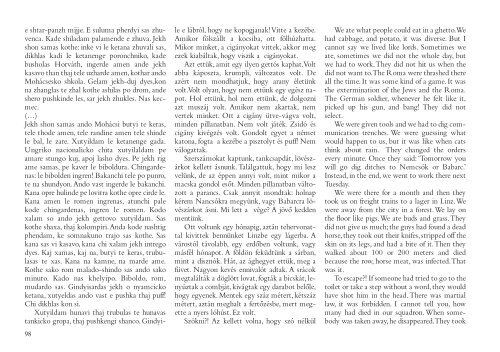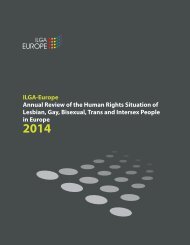Create successful ePaper yourself
Turn your PDF publications into a flip-book with our unique Google optimized e-Paper software.
e shtar-panzh mijje. E suluma pherdyi sas zhu -<br />
venca. Kade shiladam palamende e zhuva. Jekh<br />
shon samas kothe: inke vi le ketana zhuvali sas,<br />
dikhlas kadi le ketanenge poronchniko, kade<br />
busholas Horváth, ingerde amen ande jekh<br />
kasavo than thaj tele uzharde amen, ko thar ando<br />
Mohácsesko shkola. Gelam jekh-duj dyes,kon<br />
na zhanglas te zhal kothe ashilas po drom, ande<br />
shero pushkinde les, sar jekh zhukles. Nas kecmec.<br />
(…)<br />
Jekh shon samas ando Mohácsi butyi te keras,<br />
tele thode amen, tele randine amen tele shinde<br />
le bal, le zare. Xutyildam le ketanenge gada.<br />
Ung riko nacionalicko chita xutyilaldam pe<br />
ama re stungo kuj, apoj lasho dyes. Pe jekh rig<br />
ame samas, pe kaver le biboldura. Chingar de -<br />
nas: le bibolden ingren! Bakanchi tele po pun ro,<br />
te na shundyon. Ando vast ingerde le ba kan chi.<br />
Kana opre hulinde pe lovitra kothe opre cirde le.<br />
Kana amen le romen ingrenas, atun chi pale<br />
kode chingardenas, ingren le ro men. Kodo<br />
xalam so ando jekh gettovo xutyildam. Sas<br />
kothe shaxa, thaj kolompiri. Anda kode nashtig<br />
phendam, ke somnakuno trajo sas kothe. Sas<br />
kana sas vi kasavo, kana chi xalam jekh intrego<br />
dyes. Kaj xamas, kaj na, butyi te keras, trubulasas<br />
te xas. Kana na kamne, na mar de ame.<br />
Kothe sako rom malado-shindo sas ando sako<br />
minuto. Kado nas khelyipo. Bibol do, rom,<br />
mudardo sas. Gindyisardas jekh o nyamcicko<br />
ketana, xutyeldas ando vast e pushka thaj puff!<br />
Chi dikhlas kon si.<br />
Xutyildam hunavi thaj trubulas te hunavas<br />
tankicko gropa, thaj pushkengi shanco. Gin dyi -<br />
98<br />
le e lábról, hogy ne kopogjanak! Vitte a kezébe.<br />
Amikor fölszállt a kocsiba, ott fölhúz hatta.<br />
Mikor minket, a ci gányokat vittek, akkor meg<br />
ezek kiabáltak, hogy viszik a cigányokat.<br />
Azt ettük, amit egy ilyen gettós kaphat. Volt<br />
abba káposzta, krumpli, változatos volt. De<br />
azért nem mondhatjuk, hogy arany életünk<br />
volt. Volt olyan, hogy nem ettünk egy egész na -<br />
pot. Hol ettünk, hol nem ettünk, de dolgoz ni<br />
azt muszáj volt. Amikor nem akartak, nem<br />
vertek minket. Ott a cigány ütve-vágva volt,<br />
minden pillanatban. Nem volt játék. Zsidó és<br />
cigány kivégzés volt. Gondolt egyet a német<br />
katona, fogta a kezébe a pisztolyt és puff! Nem<br />
válogattak.<br />
Szerszámokat kaptunk, tankcsapdát, lövész -<br />
árkot kellett ásnunk. Találgattuk, hogy mi lesz<br />
velünk, de az éppen annyi volt, mint mikor a<br />
macska gondol esôt. Minden pillanatban változott<br />
a parancs. Csak annyit mondtak: holnap<br />
kérem Nancsókra megyünk, vagy Babarcra lö -<br />
vészárkot ásni. Mi lett a vége? A jövô kedden<br />
mentünk.<br />
Ott voltunk egy hónapig, aztán tehervonattal<br />
kivittek bennünket Linzbe egy lágerba. A<br />
vá rostól távolabb, egy erdôben voltunk, vagy<br />
más fél hónapot. A földön feküdtünk a sárban,<br />
mint a disznók. Hát, az ághegyet ettük, meg a<br />
fü vet. Nagyon kevés ennivalót adtak. A srácok<br />
megtalálták a döglött lovat, fogták a bicskát, le -<br />
nyúztak a combját, kivágtak egy darabot belôle,<br />
hogy egyenek. Mentek egy száz métert, kétszáz<br />
métert, aztán meghalt a fertôzésbe, mert meg -<br />
ette a nyers lóhúst. Ez volt.<br />
Szökni?! Az kellett volna, hogy szó nélkül<br />
We ate what people could eat in a ghetto. We<br />
had cabbage, and potato, it was diverse. But I<br />
cannot say we lived like lords. Sometimes we<br />
ate, sometimes we did not the whole day, but<br />
we had to work. They did not hit us when the<br />
did not want to. The Roma were thrashed there<br />
all the time. It was some kind of a game. It was<br />
the extermination of the Jews and the Roma.<br />
The German soldier, whenever he felt like it,<br />
picked up his gun, and bang! They did not<br />
select.<br />
We were given tools and we had to dig communication<br />
trenches. We were guessing what<br />
would happen to us, but it was like when cats<br />
think about rain. They changed the orders<br />
every minute. Once they said: ‘Tomorrow you<br />
will go dig ditches to Nemcsók or Babarc.’<br />
Instead, in the end, we went to work there next<br />
Tuesday.<br />
We were there for a month and then they<br />
took us on freight trains to a lager in Linz. We<br />
were away from the city in a forest. We lay on<br />
the floor like pigs. We ate buds and grass. They<br />
did not give us much; the guys had found a dead<br />
horse, they took out their knifes, stripped off the<br />
skin on its legs, and had a bite of it. Then they<br />
walked about 100 or 200 meters and died<br />
because the row, horse meat, was in fected. That<br />
was it.<br />
To escape?! If someone had tried to go to the<br />
toilet or take a step without a word, they would<br />
have shot him in the head. There was martial<br />
law, it was forbidden. I cannot tell you, how<br />
many had died in our squadron. When somebody<br />
was taken away, he disappeared. They took



